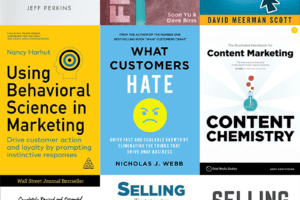Episode 54 of Yes, and Marketing
Dave Gerhardt is perhaps the biggest expert on branding in the B2B industry today. Before his current role as CMO of Privy, Dave served as VP of marketing at Drift as it created an entirely new category and now-global brand.
On this episode, Steve talks with Dave about both these roles, in addition to a smorgasbord of other insights:
- Why feedback is the most important piece of marketing
- How Drift built both a brand and a category
- The importance of founders who get marketing
- Why time management is really about people
- How creativity separates marketers from the machines
- How he thinks about teaching B2B marketing as founder of DGMG University
Guest-at-a-Glance
???? Name: Dave Gerhardt
???? What he does: CMO of Privy and founder of DGMG. Former VP of Marketing at Drift.
????️ Find Dave on the web: Privy | DGMG | LinkedIn | Twitter
???? Get smart: “Feedback is the most important piece of marketing.”
Top Takeaways
Create an audience before you create a category ????
“Feedback is the most important piece of marketing,” Dave says, and it’s essential to how he thinks about category creation. When he was at Drift, they kept up a feedback loop with their customers by continuously publishing content. In doing so, they kept their finger on the pulse of what was interesting in the industry and could be confident in what their audience wanted.
In fact, it was their audience who began using the term ‘conversational marketing,’ which became the name of the category Drift created.
“I see a lot of companies now who try to approach the category thing in the opposite way,” Dave explains. “As in, ‘We have no traffic, we have no leads, we have no audience, we have no customers—but we’re gonna name this category.’”
Instead of naming a category and then trying to create an audience for it, learn about your customers, build an audience, and create a category from there.
Founders need to get marketing ????
Dave says the biggest lesson he learned at Drift is the importance of having founders who understand marketing. “From day one, they believed that marketing was essential to grow the business,” he says. As VP of Marketing, “I was not treated as a service team—I was treated as one of the key pillars to revenue.”
This relationship allowed Dave and Drift’s leadership to be on the same page and riff on the brand story and strategic narrative together, and it was foundational to Drift becoming the global B2B brand it is today.
“I think that’s what it takes to be successful in marketing, is to have that type of CEO or founder interest in marketing,” he explains. If you’re in marketing and your company’s leadership isn’t on the same page, it’s up to you to drive that conversation and “manage up.”
Episode Highlights
How to manage up
“Let’s say you have a job and you’re just starting to realize that maybe you’re not on the same page with the CEO or the founder. The number one thing that you have to do is be proactive about it and manage up and have a conversation about marketing insights.
…Running a company, there’s just a lot of things going on. Oftentimes if someone can package something up and say, ‘Here’s a problem, here’s what we should do about it,” the person in charge is like, ‘Sure, here’s a budget. Go fix the problem.’ And I think a lot of marketers don’t think that way. Instead they’re like, ‘This company sucks. My boss doesn’t get it.’
And I’m like, well, have you tried pitching your way? Most people would just say ‘Hey, here’s three things that aren’t working well.’ Instead, say ‘Here’s three things that aren’t working well, I got three ideas on how we can fix them. Here’s one that costs a little bit of money. Here’s one that costs a lot of money. Here’s one that costs no budget. Here’s two things we could do it right now—and oh, by the way, I already did one of these things. And so here’s the changes that I wanna make. Here’s how much it would cost. Here’s a timeline.’
Present that plan. Because even if that plan doesn’t get accepted, the CEO is gonna be like, ‘Wow. Sarah is really thoughtful about marketing. We’re gonna spend more time here.’ If you do that, and they’re still not listening to it and they’re still not in tune with what you’re saying, then I think you know the answer, which is, this probably isn’t the best place for you to be working.”
Know how you’re breaking through the noise
“We live in a world of infinite supply when it comes to content. Nobody needs another podcast. Nobody needs another blog. Nobody needs another person to follow on Twitter. And so you have to go in with the mindset of, ‘Nobody needs this, so what am I gonna do to break through the noise?’ That can be some type of super fun and funny creative—go ahead and do that. Or it could be, we’re gonna just hit you with facts and use cases and proof.”
His marketing recipe
“There’s a standard recipe of ingredients that make marketing really work well, and those things are things like proof. Just because you say you’re number one or you’re the best—I don’t believe that. I need proof. I need real proof. So that means you gotta fill your creative with testimonials, examples, case studies, all that stuff.
Urgency is another big one. Like, why now? And I don’t mean you have to put in fake countdown timers and create fake scarcity. But how can you create urgency with your creative? Answer ’Why do I need to go solve this problem now?’”
Don’t let naming trip you up
The ‘Dave Gerhardt Marketing Group’—that’s how creative I am. I thought, what is this thing? It’s a group, it’s my group, so I’m gonna call it Dave Gerhardt Marketing Group. But it’s a good lesson in branding, because now it’s become a thing: DGMG. The same thing happened [with the name] ‘conversational marketing,’ right?
The amount of people that I’ve talked to that haven’t launched their thing yet because they’re stuck on the name—and somebody else has launched four things in that time. …You gotta ship it. You have to get it out there. You have to start building a community. And then they’re gonna grab onto it.”
The value of personal brands in a company
“You have two options as a CEO. You could say, ‘I don’t want anybody on Twitter because we are the company brand.’ You can do that. That’s not my way of doing things, but that might work for you. Or you can be like, ‘Wow, I’ve got a product manager who’s really passionate about this space, I’ve got a CEO who’s really passionate about this space, I’ve got a VP of marketing who’s really passionate about this space, I’ve got a sales engineer who’s really passionate about this space—let’s let them become thought leaders of their own and share what they’re doing.
And all of a sudden, instead of just the corporate brand, you now have five, six people in the company who have built up a reputation. All a brand is, is your reputation. And so as a company, you’ve built a reputation for—God forbid, you could have a reputation for, ’It seems like this company knows a lot about X. They got a lot of people talking about it, seems like they must know a lot.’ Right? That’s a good risk that I’d be willing to take for the business.”
Creativity is what separates marketers from machines
“We forget that creativity is the most important thing in marketing sometimes. And we get into the motion of just doing stuff: just blogging, just sending emails, just doing ops stuff.
As the growth of technology continues, especially as AI and automation replace more of the mundane things—like on Facebook, you can just post a video and they’re gonna magically figure out the right people to send it to— creativity will be the differentiator for you and your career, for you as a marketing team, and as a brand. And I think a lot of people tend to forget that. …It’s a creative job and creative is what’s gonna get the attention and trust of people that you’re trying to sell to.”
Top Quotes
????️ Dave:
“I like to go back and study the classics, but I also think it’s important to have your finger on the pulse of what’s happening in the media and in the culture right now.”
“Feedback is the most important piece of marketing.”
“A lot of people are quick to complain about the situation, but they are not quick to create action and create the change.”
“No one goes to school for B2B marketing.”
“A brand is your reputation.”
“Don’t forget that creative is often the variable for success.”



